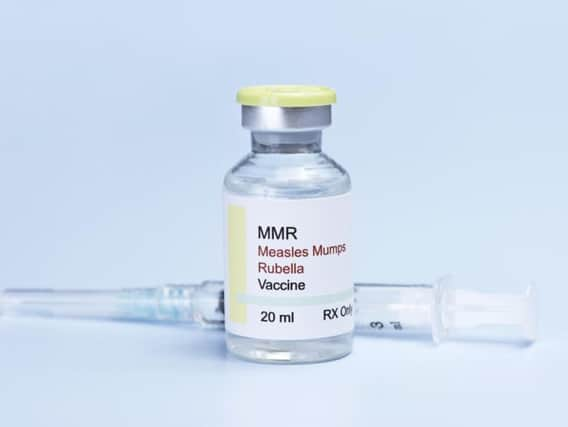Anti-vaccine posts could be banned on social media after measles outbreak


Health and Social Care Secretary Matt Hancock said he was pressing for new legislation which would force social media companies to remove content promoting false information about vaccines.
He said the government was working with internet companies to identify misleading material on jabs, including Measles, Mumps and Rubella (MMR), and that artificial intelligence programmes could be used to prevent ‘bad science’ being promoted online.
Advertisement
Hide AdAdvertisement
Hide AdMr Hancock told the BBC: "We are looking at legislating for the duty of care that social media companies in particular have towards the people on their sites - this is an important part of that duty of care alongside all the other things that social media companies need to do, like tackling material that promotes suicide and self-harm and, of course, terrorism."
‘A threat to global health’
His comments come as a county in New York State declared ‘a state of emergency over a measles outbreak so severe it has led to unvaccinated children being banned from public spaces, under the threat of up to six months in prison for anyone caught violating it.
Rockland County, in New York State, is currently dealing with more than 150 cases of measles. Vaccination rates have dropped steadily in the US, in large part because of discredited information that vaccines cause autism in children.
It is not alone however. Across Europe the last two years have seen a sharp rise in measles cases. Recorded instances of the disease more than doubled from 2017 to 2018, while major outbreaks have hit the Phillippines and Japan.
The World Health Organisation named vaccine hesitancy – “the reluctance or refusal to vaccinate despite the availability of vaccines” – as one of the top threats to global health in 2019.
Measles is a highly infectious disease and can cause serious health complications, including damage to the lungs and brain. It kills an average of 90,000 people every year.
The disease used to be common in the UK, but following the introduction of measles vaccine in 1968 and the MMR vaccine in 1988, incidents decreased to almost zero. However, in recent years recorded cases have been creeping up. In England last year there were 757 reported cases, and while Scotland recorded only two there are concerns a campaign of misinformation about the MMR vaccine is leading people to avoid treating their children
Companies urged to take action
Concerns have been heightened by the sharing of unfounded fears and misinformation about the dangers of vaccines online.
Advertisement
Hide AdAdvertisement
Hide AdIn February a report by The Guardian found that all of the top 12 Facebook groups and eight of the top 12 Facebook pages that appeared under the search ‘vaccination’ were arguing against the benefits of vaccines.
Facebook has now said it will stop allowing advertisements that include misinformation about vaccines, and aims to further reduce exposure by reducing their ranking in search results and on the News Feed, removing them from autofill suggestions in the search bar, and removing them from recommendation features such as “Groups You Should Join”.
The policy change will also extend to Instagram, where misinformation about vaccines will be excluded from recommendations on the “Instagram Explore” or on hashtag pages.
In a statement Facebook, which owns Instagram, said: "We are working to tackle vaccine misinformation…by reducing its distribution and providing people with authoritative information on the topic."
Other companies had already moved swiftly to stop the problem. Pinterest banned a number of anti-vaxx boards, blocked pins from ‘health misinformation’ websites and even broke its own search tool for phrases such as ‘vaccine’.
YouTube announced in January that it was reworking its recommendation algorithm to reduce the number of videos that “could misinform users in harmful ways” – a policy that includes some anti-vaccine misinformation. The company also demonetised a number of anti-vaxxer YouTube channels. And earlier this month Amazon removed several anti-vaccine propaganda movies from its streaming video service.
Professor Dame Sally Davies, England's chief medical officer, said anti-vaccination campaigns needed to be vigorously resisted.
"I don't like it that bad science is pushed to parents - I don't like quackery - I want them to know the truth that vaccines are very safe that have been used for decades," she said.